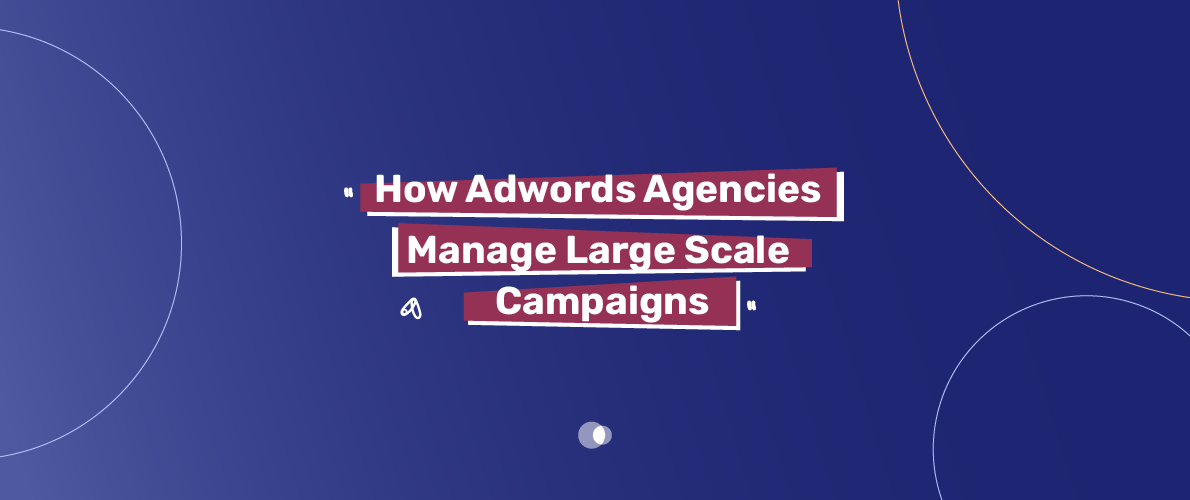In the fast-paced world of digital ads, Google Ads is a key tool for businesses to connect with their audience. Handling big Google Ads campaigns needs special strategies and tools. Adwords agencies have become experts in this area, using advanced methods to get great results for their clients.
Table of Contents

Key Takeaways
- Adwords agency use detailed campaign plans to handle big Google Ads projects.
- Automation and machine learning are key in improving bids, ad relevance, and performance.
- Improving quality scores, like landing page optimization and ad relevance, is essential for lasting campaign success.
- Strategies for managing multiple accounts help agencies keep control and track of big Google Ads projects.
- Strong reporting and analytics tools let agencies make informed decisions and show clear results to their clients.
Understanding the Fundamentals of Large-Scale Google Ads Management
Managing big Google Ads campaigns is complex. It needs a deep understanding of key parts. These include how to use resources well and the right tools and software. These basics are key for success and growth.
Key Components of Enterprise-Level Campaign Structure
A good Google Ads strategy starts with a solid campaign structure. At the big company level, this means a clear plan for campaigns, ad groups, and ads. Each part targets different audiences and products. This structure helps campaigns grow and be seen more clearly.
Essential Tools and Software Requirements
Big Google Ads campaigns need a lot of tools and software. These help with workflow, data analysis, and automating tasks. The right tools make it easier to manage and grow campaigns.
Resource Allocation and Team Organization
Managing big campaigns well depends on using resources wisely and organizing the team well. By matching the right people with the right tasks, teams work better together. This ensures each campaign gets the focus it needs.
| Key Components | Essential Tools | Resource Allocation |
| Hierarchical campaign structureAudience segmentationProduct/service-specific ad groups | Reporting and analytics platformsBid management toolsAutomation and optimization solutions | Dedicated campaign managersSpecialized ad copywritersData analysts and strategists |
“Effective campaign management at the enterprise level requires a meticulous balance of strategy, tools, and team organization. By mastering these fundamentals, agencies can unlock the true potential of large-scale Google Ads campaigns.”
How Adwords Agencies Manage Large Scale Campaigns
Managing big PPC campaigns is complex. Adwords agencies use special strategies for large Google Ads accounts. They make sure campaigns run smoothly and are optimized.
They focus on making workflows better. Agencies know how to make processes faster and automate tasks. They use campaign management tools to work more efficiently. This helps them handle the big data and decisions needed for large PPC campaigns.
Good communication with clients is key. Agencies keep their clients in the loop with regular updates. They also ask for feedback to make sure campaigns meet business goals. This builds trust and keeps the focus on what the client wants.
Tracking performance is also important. Agencies watch metrics like click-through rates and conversion rates. This helps them find ways to improve and make their clients’ ads work better.
In short, Adwords agencies use many strategies to manage big campaigns. They focus on workflow, communication, and tracking performance. This helps them get great results for their big clients.
Automation and Machine Learning in Campaign Management
As Google Ads campaigns grow, agencies need new tech to manage them. Google Ads automation and machine learning are key to this.
Smart Bidding Strategies for Scale
Smart bidding, powered by machine learning, helps manage big campaigns better. It uses real-time data to adjust bids and budgets. This optimizes for goals like conversions or ROAS.
Smart bidding removes the guesswork from bidding. This leads to better campaign performance at scale.
Automated Rules and Scripts Implementation
Agencies can also boost efficiency with automated rules and scripts. These tools let agencies set up automated actions and optimizations. This includes pausing bad ads and adjusting bids.
Automating these tasks saves time and resources. Agencies can then focus on strategic decisions.
AI-Powered Optimization Techniques
- Agencies can use artificial intelligence (AI) and machine learning for advanced Google Ads optimization.
- AI tools analyze huge data sets to find patterns and trends. This helps make better, data-driven decisions.
- AI solutions, like predictive targeting and creative optimization, keep agencies ahead. They drive better campaign results.
By using Google Ads automation and machine learning, agencies can manage big campaigns better. They deliver great results for their clients.
Budget Distribution and Performance Tracking
Managing big Google Ads campaigns needs a smart plan for budget and tracking. Adwords agencies must balance ad spend, performance, ROI, and budget well. This ensures clients get the best from their ad money.
When managing big campaigns, it’s key to spread the budget right. Agencies must analyze data to find the best places to spend. They watch metrics like click-through and conversion rates to guide their spending.
Tracking ROI is also crucial. Agencies need strong reporting and analytics to see how ads perform. They use dashboards and KPIs to show clients how their ads are doing.
By smart budgeting and tracking, Adwords agencies can make the most of Google Ads. This helps clients get the most from their ads and reach their goals.
“Effective budget distribution and performance tracking are the cornerstones of successful large-scale Adwords management.” – [Expert Name], Founder of [Agency Name]
Quality Score Optimization at Scale
In the world of large-scale Google Ads campaigns, optimizing for Quality Score is key. Quality Score shows how well your ads and landing pages perform. By improving Quality Score, you can lower your cost-per-click and make your ads more visible. This boosts your return on investment.
Landing Page Optimization Strategies
Landing page optimization is a big part of Quality Score improvement. Your landing pages should match your ads closely. They should load fast, have clear copy, and a strong call-to-action. Testing and refining your landing pages can raise your Quality Scores.
Ad Relevance Management
Managing ad relevance is also crucial. Your ads should speak to your audience. Update your ad text regularly and use relevant keywords. This keeps your ads relevant and boosts your Quality Score.
Click-Through Rate Enhancement
Improving your click-through rate (CTR) is vital. Ads that grab attention lead to more clicks. Try different ad formats and copy to find what works best. This can significantly improve your CTR and Quality Score.
| Optimization Technique | Impact on Quality Score |
| Landing Page Optimization | Improves the user experience and relevance, leading to higher Quality Scores. |
| Ad Relevance Management | Ensures your ads are closely aligned with user intent, contributing to higher Quality Scores. |
| Click-Through Rate Enhancement | Higher CTR indicates better ad performance and relevance, resulting in improved Quality Scores. |
By focusing on these Quality Score strategies, you can make your Google Ads campaigns more effective. This leads to sustainable growth for your business.
“Quality Score is the foundation of a successful Google Ads campaign. Optimizing for this metric can lead to significant cost savings and performance improvements.”
Cross-Account Management Strategies
Managing big Google Ads campaigns can be tough for digital marketers. But, with the right tools and strategies, agencies can make their work easier and get better results. One key strategy is managing many accounts and campaigns at once, called cross-account management.
At the heart of cross-account management are Manager Accounts, once known as MCC (My Client Center) accounts. These tools help agencies manage their clients’ Google Ads accounts from one place. This makes their work more efficient and cohesive.
Leveraging Manager Accounts for Streamlined Operations
Manager Accounts bring many benefits for managing multiple accounts. Some main advantages are:
- Consolidated reporting and analytics across all managed accounts
- Ability to apply universal campaign settings and optimizations
- Streamlined billing and payment processing
- Simplified user management and access control
With Manager Accounts, agencies can do cross-campaign optimization. They can share insights and best practices between accounts. This improves performance across their whole portfolio.
Implementing Effective Cross-Account Strategies
To get the most from cross-account management, agencies should follow these strategies:
- Set up a centralized multi-account management structure. Have a team focused on all client accounts.
- Use the same naming conventions and campaign structures in all accounts. This makes cross-account optimization easier.
- Use automated rules, scripts, and machine learning tools to improve campaign optimization and tracking.
- Regularly check cross-account data and insights. Look for chances to improve and scale successful strategies.
By using these strategies, agencies can become more efficient, agile, and successful with their Google Ads campaigns.
| Feature | Benefit |
| Consolidated Reporting | Get a complete view of campaign performance across all managed accounts |
| Universal Optimizations | Apply successful strategies and settings to many accounts at once |
| Streamlined Billing | Make financial management and payment processing easier for all client accounts |
| Centralized User Management | Manage account access and permissions for your team and clients easily |

“Effective cross-account management is the key to unlocking the full potential of enterprise-level Google Ads campaigns.”
Reporting and Analytics for Enterprise Campaigns
In the world of big Google Ads campaigns, good reporting and analytics are key. Adwords agencies handle big campaigns by using top tools to find important insights. They work with huge amounts of data from these big digital marketing efforts.
Custom Dashboard Creation
Top Adwords agencies make custom dashboards. These dashboards bring together important Google Ads data, KPIs, and performance indicators. They give a central place for people to see how campaigns are doing and find ways to get better.
By making dashboards their own, agencies make sure leaders get the most important and useful information right away.
KPI Tracking and Analysis
Adwords agencies are also great at tracking and analyzing KPIs. They watch things like click-through rates, conversions, cost-per-acquisition, and return on ad spend. They look at a lot of important indicators to see how campaigns are doing.
They dig into the data to find trends, oddities, and patterns. This helps them suggest ways to improve campaigns and increase ROI.
Performance Visualization Tools
Adwords agencies also use powerful tools to make data easy to see. These tools turn complex data into simple charts, graphs, and dashboards. This makes it easy for people to spot what’s working, what’s not, and where to improve.
These tools include interactive reports and dynamic heat maps. They make it fun and easy to see how Google Ads are doing on a big scale.
| KPI | Q1 2022 | Q2 2022 | Q3 2022 | Q4 2022 |
| Impressions | 12,345,678 | 13,456,789 | 14,567,890 | 15,678,901 |
| Clicks | 123,456 | 134,567 | 145,678 | 156,789 |
| Click-Through Rate | 1.00% | 1.05% | 1.10% | 1.15% |
| Conversions | 12,345 | 13,456 | 14,567 | 15,678 |
| Conversion Rate | 10.00% | 10.50% | 11.00% | 11.50% |
| Cost-per-Conversion | $50.00 | $47.50 | $45.00 | $42.50 |
By using these advanced reporting and analytics methods, Adwords agencies help big clients make smart choices. They improve campaign performance and drive big growth and ROI in the long run.
Risk Management and Problem Resolution
In the world of Google Ads, managing risks and solving problems is key. Adwords agencies need strategies for campaign troubleshooting, risk mitigation, performance recovery, and crisis management. This keeps campaigns stable and performing well.
Proactive monitoring and early detection are crucial. Agencies must track campaign metrics closely. They should use automated alerts and dashboards to spot issues early.
- Implement comprehensive campaign troubleshooting protocols: Create a method to find and fix technical problems, budget issues, and ad performance drops.
- Develop risk mitigation strategies: Plan for risks like market changes, policy updates, or competitor moves. Have backup plans to lessen campaign impact.
- Prioritize performance recovery efforts: When campaigns stumble, agencies should quickly find the cause, fix it, and get back on track.
- Adopt crisis management best practices: Set up clear communication, escalation steps, and decision-making plans. This helps in high-pressure times and keeps clients trusting you.
By managing risks, fixing problems, and getting campaigns back on track, adwords agencies help their clients succeed. This is important in the fast-changing digital ad world.

“Effective risk management is not about eliminating risks, but rather about managing them strategically to ensure the long-term success of your campaigns.”
Conclusion
Managing large-scale International Adwords company requires a detailed approach. This includes strategic planning, using new automation, and always looking to improve. We’ve covered the basics of managing big Google Ads campaigns, from setting up structures to organizing teams.
Agencies can use automation and machine learning to make their work easier. They can also use smart bidding and AI to improve their ads. It’s important to manage budgets well, track performance, and keep quality scores high.
Being able to handle big campaigns means more than just managing ads. It’s about creating reports, solving problems, and managing risks. Staying up-to-date with these practices is crucial for success in PPC advertising.
FAQ
1)What are the key components of an enterprise-level Google Ads campaign structure?
An enterprise-level Google Ads campaign structure includes several key parts. These are campaign hierarchies, ad group organization, and keyword targeting. It also includes ad variations and audience segmentation.
2)What are the essential tools and software requirements for managing large-scale Google Ads campaigns?
To manage large-scale Google Ads campaigns, you need certain tools and software. These include campaign management platforms and bid optimization tools. You also need reporting and analytics software, and automation scripts.
3)How do agencies efficiently allocate resources and organize their teams for large-scale Google Ads management?
Agencies organize their teams by function. This includes account strategists, campaign specialists, and data analysts. They allocate resources based on campaign size, complexity, and performance goals.
4)What are the key strategies and techniques used by Adwords agencies to manage large-scale campaigns effectively?
Adwords agencies use several strategies to manage large-scale campaigns. These include workflow optimization and client communication. They also track performance and continuously optimize campaigns.
5)How do Adwords agencies leverage automation and machine learning to improve the management of large-scale campaigns?
Adwords agencies use smart bidding strategies and automated rules and scripts. They also use AI-powered optimization techniques. These help improve campaign performance and efficiency at scale.
6)What are the best practices for distributing budgets and tracking performance in large-scale Google Ads campaigns?
For budget distribution and performance tracking, agencies use data-driven budget allocation. They also do comprehensive reporting and focus on ROI. This ensures optimal ad spend and maximum return on investment.
7)How do Adwords agencies approach Quality Score optimization for large-scale campaigns?
Adwords agencies focus on landing page optimization and ad relevance management. They also enhance click-through rates. These strategies help maintain and improve Quality Scores in large-scale campaigns.
8)What are the effective cross-account management strategies used by Adwords agencies?
Adwords agencies use tools like Manager Accounts (formerly MCC) for cross-account management. They implement optimization techniques to streamline management of multiple accounts and campaigns.
9)What are the key reporting and analytics capabilities required for enterprise-level Google Ads campaigns?
For enterprise-level Google Ads campaigns, key reporting and analytics capabilities are needed. These include custom dashboard creation and KPI tracking and analysis. Performance visualization tools are also used to gain actionable insights and drive informed decision-making.
10)How do Adwords agencies handle risk management and problem resolution in large-scale campaigns?
Adwords agencies use strategies for campaign troubleshooting and performance recovery. They also have crisis management plans. These strategies help mitigate risks and ensure the stability and effectiveness of large-scale campaigns.

